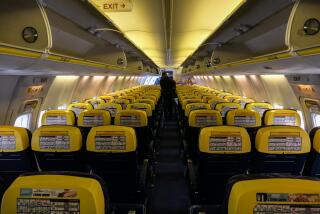A moving image got this wheelchair maker rolling
- Share via
Thirteen years ago, a biomedical engineer in Orange County had a religious awakening and began tinkering with plastic lawn chairs and bicycle wheels in his garage.
Don Schoendorfer, who has a doctorate from the Massachusetts Institute of Technology, was in search of the perfect wheelchair for the poor in the developing world — a vehicle that would be light, durable and, above all, cheap.
His peers thought he had gone off the deep end. Even his wife, although supportive, soon tired of his creations cluttering the garage of their Santa Ana home.
But Schoendorfer kept plugging away, and his modest dream of building a better wheelchair became a massive undertaking. Now he heads the Free Wheelchair Mission, a faith-based nonprofit headquartered in Irvine that says it has given away nearly 500,000 wheelchairs in 77 developing nations.
The manufacturing center long ago moved from Schoendorfer’s garage to two factories in China where the wheelchair components are produced at a cost of about $60 each. The organization has grown from a volunteer effort to a nonprofit with a staff of 18 and a $6.5-million budget. The chairs have been shipped to India, Peru and post- earthquake Haiti, among other countries.
Schoendorfer, 61, said he has learned to relax and trust in God.
“I used to live by goals, I used to live by plans, and very elaborate goals and backup plans,” he said. “Now I feel like I’m more reacting and keeping an open mind and keeping a strong faith.”
The genesis of the wheelchair project came in 1977 when Schoendorfer made a four-day trip to Morocco with his wife, Laurie. They saw a beggar who had lost the use of her legs dragging herself across a dirt road while passersby ignored her.
The image stuck with Schoendorfer, but it wasn’t until 20 years later that he figured out how he might help.
In the meantime, he had moved from Boston to Orange County, “which is where you go when you want to make a lot of money,” he said. He believed in God, but religion was not part of his daily life.
Then his oldest daughter developed bulimia, and the three-year struggle brought the family back to its Christian faith.
Soon afterward, in 1997, a sermon by Pastor Kenton Beshore at Mariners Church in Irvine gave Schoendorfer a kick start. The sermon was based on a biblical parable about a rich man who spends his life building bigger grain silos but dies before he can enjoy the wealth he has stored.
The story struck a nerve with Schoendorfer.
“You start to feel like there’s a reason for you being here, and it could be a little deeper than getting a job and having a home and raising a family,” he said.
After casting around for a mission, Schoendorfer remembered the beggar in Morocco.
Two years and many hours of research and tinkering later, he had a working prototype for a low-cost wheelchair. He had settled on bicycle tires and light resin lawn chairs as his base materials because they were the cheapest to produce. He demonstrated the first model to Pastor Skip Lanfried in the Mariners Church parking lot. Lanfried, who would become one of the nonprofit’s founding board members, loved the project.
By 2001, after getting up before dawn many days to work in the garage before heading to the office, Schoendorfer had a stockpile of 100 chairs.
He gave his first one to a family in a small agricultural village in India whose young son had cerebral palsy. When he returned to the United States, he found that the company he worked for was going bankrupt.
“It was like a two-by-four over the head. If I didn’t get it from this experience, from India, it was like God saying, ‘What else do I need to do to show you this is important?’” he said.
Soon after, the Free Wheelchair Mission had a board of directors and had become a “full-time and then some” endeavor for Schoendorfer, although it would be several years before it paid a salary.
The chair has evolved since the first prototype. This year, Free Wheelchair Mission will ship a new model engineered for people who need full body support. It aims to give away a total of 20 million chairs.
The nonprofit remains focused on its Christian mission, supported largely by faith-based groups, and it is working with Christian distribution partners overseas. But Schoendorfer said the primary goal is to make sure the chairs get to people who need them.
“We’re not an evangelical organization, because we don’t want anyone to think there’s a requirement to get a wheelchair,” he said. “There are no strings attached.”
Everyone involved in the project has a favorite story. Lanfried’s is about a 5-year-old boy in the Democratic Republic of Congo. The boy lived in an orphanage for disabled children, where he spent most of his time lying on the floor except for trips to the bathroom.
A week after giving the boy his new chair, Lanfried was heading to the airport when he caught a glimpse of something familiar on the side of the street. It was a wheelchair. The little boy was in it, being pushed by an older boy, who was running. The boys were laughing.
More to Read
Sign up for Essential California
The most important California stories and recommendations in your inbox every morning.
You may occasionally receive promotional content from the Los Angeles Times.











